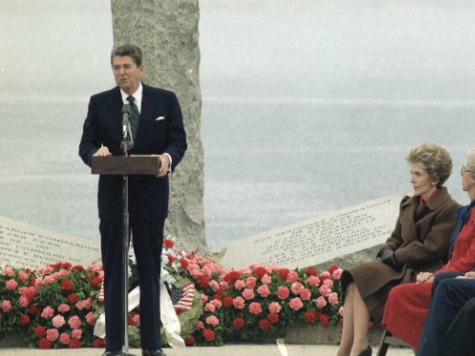
On June 6, 1984, the 40th anniversary of D-Day, President Ronald Reagan stood on what he called a “lonely, windswept point on the northern shore of France” to deliver an oration that would become known as his “Boys of Pointe du Hoc” speech. He made this speech in front of 62 survivors of the 2nd Ranger Battalion who courageously scaled the 100 ft. high cliffs on that fateful day.
The 225 Rangers who fought at Pointe-du-Hoc demonstrated almost unimaginable bravery and took heavy losses in the battle. In their attempt to take the important strategic location–135 Rangers would lose their lives. To put this in perspective, only 110 of the 670 British cavalrymen were killed in the famously doomed “Charge of the Light Brigade” during the Crimean War.
Historian Douglas Brinkley wrote in his book The Boys of Pointe du Hoc: Ronald Reagan, D-Day, and the U.S. Army 2nd Ranger Battalion, “With Reagan as president, the time had come for the World War II generation to speak out. By 1984, the stars were aligned for thousands of these stoic war heroes to finally offer eyewitness testimonials for posterity’s sake. It was, in essence, a generational reckoning.”
The speech that Reagan delivered, written by Peggy Noonan, rivals some of the greatest patriotic orations in American history, such as Daniel Webster’s Plymouth Oration and Abraham Lincoln’s Second Inaugural Address. It was one of the most profound tributes to the generation that won World War II, and more than that, affirmed that the United States would continue to be a force for good in a world of darkness. By describing how America defeated the Nazis and liberated Europe from their barbaric grasp, he was also aiming at the Communist Soviet Union that still held tight to the Eastern bloc.
Noonan explained how the subtext of the speech was most important and Reagan’s true purpose:
The subtext was a message aimed at the leaders of the West and the people of Europe. It was: Fellow NATO members, you must remember that just as our fathers beat back the totalitarian Nazis, we now must beat back the totalitarian Soviets–and we can do it, we can triumph if we hold fast, hold firm and stand together just as our fathers did 40 years ago.
Noonan said that this speech was not just a “commemorative event,” but an attempt to “exhort, persuade, and move history.” The result was one of the finest speeches the “Great Communicator” ever delivered.

COMMENTS
Please let us know if you're having issues with commenting.